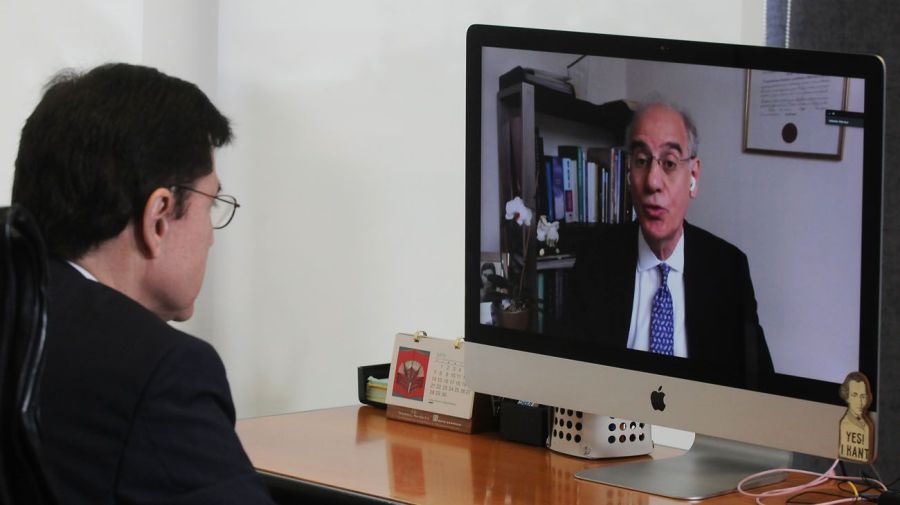Dr Rifat Atun is a Professor of Global Health Systems at Harvard University and the Faculty Chair for the Harvard Ministerial Leadership Program. His research focuses on design, implementation and evaluation of health system reforms and on innovation in health systems.
Dr Atun spoke with Perfil's Jorge Fontevecchia in an exclusive interview focused on the coronavirus pandemic.
WATCH THE INTERVIEW
What explanation can you give us that in 150 days, the virus has been present in all countries of the world, while it was not so with SARS 1 and MERS?
Excellent question. And thank you for this opportunity to contribute to Perfil. It’s a great honour and privilege to take part in this interview.
What was different with the cause Covid-19 or as far as coronavirus-2, is that first of all with SARS coronavirus the world reacted very quickly, but with this coronavirus there was so much delay so in many countries. So for example, in Europe, even though in January we knew that there was an outbreak in China, it was not until two months later that some of the responses were introduced by them. The virus had spread very rapidly to many countries around the world – with MERS the response was much quicker, and with SARS 1 as well, the response was much quicker. So the virus did not have a chance to transmit to and spread to other countries. And with MERS, it emerged in Saudi Arabia, where the air traffic and mixing was not that large. So a very different type of pandemic.
But I think the main reason is that the response was delayed very substantially.
Has it just been confirmed that the virus is not spread through urine or faeces?
In terms of the transmission, the virus is spread through droplets and through air. So there is no evidence at the moment that it is spread through body excrement. Hence the public health response, which has been aimed at minimising the transmission of these droplets and the virus in the air.
Little viral RNA was found in ventilated patient rooms, but more in patient toilets and where medical workers remove protective equipment. Could the Covid-19 be transmissible through particles suspended in the air?
Yes, this is one of the very interesting features of this virus, in that it was staying in there for a while and has been transmitted. This is why it's not just the droplets, which tend to fall because of gravity fairly quickly, but also by being suspended in the air. Therefore, use of masks is quite effective in reducing, especially, masks can prevent the virus from moving from one person to the air. It’s actually been quite an effective method for minimising transmission.
Conversely, opinions have appeared that the virus does not stay on surfaces. Is it possible to confirm that it adheres to surfaces or not?
Yes, the virus does stay on different surfaces for different periods of time. And I think this is well demonstrated and there's good evidence for that. Therefore, the use of hand hygiene is particularly important, as well as regular hygiene for the surfaces where people come in contact with the individuals who might be infected. And the duration of the survival of the virus on surfaces varies from several hours to a few hours.
Do you believe in herd immunity? Is this epidemiological position ethical?
Well, I think this area has two very important questions. The first is what is herd immunity? And the second is what is our ethical position in trying to attain it?
The first introduction to herd immunity is that this can be achieved and in two ways. One is gaining active immunity through vaccination. Now, the challenge with this is that a vaccine – although there are several vaccines currently in clinical trials, almost one 100 vaccine candidates with around eight of them actually being tested on humans at the moment – we do not have yet a vaccine that is safe or effective enough to be used at scale. So no vaccine has yet been approved and it will probably take around 10 to 12 months before a vaccine is available globally to create this kind of immunity.
Now, even if a vaccine is available, we don't know the level of immunity and the duration of immunity that will be afforded by a vaccine. So we are in unknown territory. The second method, or the second way herd immunity can be created, is through enough individuals being infected with the virus to generate the antibodies to unfold in response to the infection and then become immune to the infection, and hence not being able to transmit it to others. Based on the basic reproduction number of SARS-coronavirus-2, we expect this level to be around 60 percent of the population. But what we don't know at the moment is whether the presence of antibodies following infection confers immunity. And secondly, what is the level of this immunity. And third, what is the duration of this immunity.
Hence, wild herd immunity is a powerful concept. We do not have the tools to measure it. Which brings me to your excellent question, the ethical dimension of this. If we don't have the information, it will be very difficult to develop policies. It will be unethical to develop policies that suddenly lift restrictions in countries. So one has to be very careful before restrictions are lifted to see what the effect of the policies might be on new infections as well as deaths.
How do you interpret the fact that a high percentage of those infected do not have antibodies detected?
Well, that's an interesting question. And the evidence on this actually points to the fact that many people who are infected do develop antibodies.
Some do not or some have not, using the measurements that we currently have now. That might mean that the antibody tests we have are not sensitive enough to detect the antibodies at the levels that are available in blood, because for antibodies we use a serological test. And many of the tests that have been developed are not sensitive enough or specific enough for the first coronavirus 2.
So as yet, we are not certain whether some individuals do not develop antibodies. Some might not. But the vast majority of those that do have infection do develop antibodies. And some new highly sensitive and specific antibody tests have been introduced there recently. So we should have more information and more evidence from them.
What do we know about the immunity that this virus produces? Is immunity from being infected enough to protect against future reinfection?
Well, I think, as I said earlier, at the moment, we don't know the level of immunity and the duration of the immunity following infection. But in relation to immunity, there are two types of immunity. One is what we call humoral immunity from antibodies, and the second is cellular immunity from the response of some of the immunological cells that we have in the body. At the moment, we don't have enough evidence on the magnitude of the immunity and the duration.
That said, our knowledge of the family of coronaviruses suggests that they particularly lead to immunity that may be 9 to 12 months. So it typically lasts for a season or two seasons. So if this coronavirus behaves such as other coronaviruses, for example those that cause the common flu, We might expect a level of immunity that lasts a year or even 18 months for one to two seasons. But we have only been into this pandemic for five months, so it's difficult to know and have answers to these questions.
It is highly probable that the coronaviruses, which are plentiful, did begin moving from animals to humans yesterday. The conditions for that to happen have been in place for a very long time.
Do you have any speculation as to why in the last 17 years we have observed three successive events and had no record of similar ones in centuries? Can you assume that they were "little flames" that went out in the East without spreading when air traffic was not current?
Well, that's an excellent question, which I'm sure many people would like to have an answer to. And there are many theories and scientific evidence to help answer that question. First of all, we know that coronaviruses, many of them live in many animals, especially in bats. And from time to time, they jump from an animal poop to a new host. This may be a human being or they may jump to an intermediate host where they might change or mutate and jump to a human being … there are various mechanisms how this jump from animals to humans can happen.
Now, the question is, why is this happening more often than before? The theories are that the ecosystems for animals and ecosystems for humans are being destroyed. At the moment we're in the Anthropocene era where we are seeing a destruction of these ecosystems. This is leading to greater mixing of animals and humans in settings that did not exist. So the opportunity for transmission through mixing and through changing practices increases the potential for the zoonosis, these kinds of infections, to emerge and form mutations that occur because we're seeing more viruses jumping to try to host more of them. And I think this is what's happening in relation to coronaviruses.
There have been differences between the virus that affected China with respect to the one that circulates in other regions of the world, what implications can this have?
Yes, that's a very important consideration. Viruses mutate, so they change as they infect the host. And as they are transmitted from one person to another. So this mutation means that the virus type is slightly different and changes over time.
Now, this has two implications. One, if the infection does confer immunity, if the infection is changing, that immunity may not be effective. So individuals who might have been infected, might be infected again, because the virus has mutated or changed so much. So that's a big problem, including for the development of a vaccine, because one is developing a vaccine using certain parts of the virus. But if the virus has mutated, the antibodies generated against that particle may not be what is the infective part in the new virus. So the vaccine may not be effective or very effective because the memory it creates is for a different type of particle. This is why we have a different flu vaccine each year, because flu virus changes.
The second implication is that the profile of the infection might be slightly different inside the different population. Given this mutation, if they develop treatments for a particular kind of effect of the virus, this may not work when the virus has mutated or changed substantively. And this is why we have to monitor how the virus is changing at a point in time, whether it is becoming more infective, is becoming more transmissible, and whether the antibody response changes over time.
Could an excess in the application of quarantines generate more future deaths than now, due to other types of diseases caused by a greater economic crisis?
Yes, this is a big challenge for all countries. So the coronavirus-19 pandemic has impacted on four major areas.
The first is the direct causes of the infection that's leading to death from Covid-19. And we've seen hundreds of thousands of people dying across the world because of that.
The second effect, which is also health effects, is that because the hospitals are now dealing with Covid-19, they have not been able to manage other conditions. So there is a delay in these conditions being managed in hospitals or some conditions are not being treated at all. For example, many surgeries for cancer have been postponed for weeks and weeks. Then, many individuals have postponed their use of the health system because either they are not able to access the health system or they're worried that they might get infected when they access the hospitals. And, many people, because now they are unemployed, if there's no universal health coverage, they're not able to afford the use of the health system. So the second byproduct is these excess deaths, because It’s not directly from coronavirus, but because of its effect on the health system.
The third dimension is the economic crisis, which is looming everywhere around the world. The global GDP is projected to decline by several percentage points, up to six percent in developed countries and less so in developing countries. So as a result of this economic crisis, many people will be left unemployed. They will not be able to afford healthcare. Their health will deteriorate as a result. So there will be a number of deaths as a result of this economic recession.
And the fourth dimension is the social impact because of the economic crisis – unemployment will rise, the solidarity that exists within countries will most likely suffer. And this will have other social consequences, one of which is obvious consequences for health. So we are seeing it like a Russian doll, multiple effects of the coronavirus. But the effects from the economic and social reasons is likely to be higher than the direct causes of death from Covid-19.
Is Bill Gates’ idea of massive testing at the doors of workplaces a possible solution before the existence of a vaccine?
Much of testing is important because it tells us if it's an antigen test, it tells us how many infections there are at some point in time. And this is very important to understand the trajectory of the epidemic, but also to identify those infected and rapidly isolate them and then quarantine those who have been in contact with the infected individuals.
This helps very quickly to halt the transmission, as we have seen, for example, in South Korea, who was very effective in rapid testing, isolation and quarantining. If they're using antibody tests, we also know how many individuals have had an infection. So we'll have an idea of what kinds of herd immunity might be developing by looking at the number of infections emerging in an area. This helps us to understand the evolution of the epidemic and then introduce policy responses to these. So much of the testing is critically important to understand where we are, because without this knowledge, we are flying blindfolded, which is not a safe thing to do.

The United States does not have a generalised public health system. How does cooperation with the private medical system work in the face of pandemics?
In many countries the private sector has been included in the response very effectively. So the private sector capacity has been harnessed effectively to develop technologies, for example, mobile telephone technology, as well as testing, developing testing capability to develop tests and scale up production to develop a response. Private sector capacity has also been used in supply chain management, as well as in creating hospital capacity for what you call search capacity, to create an additional number of intensive care unit beds to admit those who are adversely affected by the virus. So public and private sector, when they have worked together – and we are seeing examples of this – this has really strengthened the response. And this is also happening in the United States.
But the challenge with the United States is that the response was very delayed, and it varies from state to state. It states are doing something slightly different. Now, the problem with this is that viruses don't recognise borders. If one state has an effective policy and the next-door neighbour does not, if individuals move from the one with ineffective policies to the one where there are effective policies, then the mixing is going to happen and the virus are going to be transmitted, so one of the challenges in the US system, beyond the delay, is inconsistent policies in in fighting the virus, with terrible consequences for individuals.
Could it be said that the degree of effectiveness in the fight against Covid-19 will have a political consequence in the elections of its leaders? And how will it affect Trump's chances of being re-elected?
Absolutely. This is politics. It’s important to take politics at country level, but also very important at global level.
So at country level, we are seeing that in countries where the response has been ineffective. For example, in the United Kingdom, the popularity of the current government has sharply declined over the last few weeks, because the citizens feel that the country is not responding effectively, even though the current government came into power with their substantial majority. And we are seeing the same effect in other countries, where citizens are protesting or systems that actually are changing their support from one party to another party.
We are seeing examples of this in several Latin American countries, as well as European countries. Now, of course, we have to wait and see what happens with the pandemic that rested in the early days. This is a marathon, but there is no doubt that the health, social and economic impacts have political consequences for the country.
The second big political change we are seeing is the global politics. We're seeing a change in the current order, the current political order in the world. We are seeing polarisation in part to occur between the US and China, with other countries finding themselves having to choose between one or the other. Again, it's early days with this polarisation.
It will be interesting to see what happens going forward, whether we're going to have a Cold War again with two major powers and followers on each side. But the United Nations system is being undermined in the current fight, including the World Health Organisation – for example, the United States recently announced that it would no longer cooperate with the World Health Organisation and would stop funding. And as the major funder, this has terrible consequences for the World Health Organisation in the middle of a pandemic.
Is it correct to say that Covid-19 is democratic in that it infects the rich and poor alike but not in its lethality because the poor die proportionately more?
Yes, very interesting. Just before I spoke to you, I was working on a slide, on a presentation, and I have a slide on this. Epidemics historically have been said to be the great equaliser. But actually, what coronavirus is showing us is exactly the opposite. The coronavirus pandemic has actually increased inequality. What we are seeing in many countries is that those infected are mainly those individuals from low-income groups. In the cases of countries such as the US and the UK, black and ethnic minorities, including countries that have a mixed population. So this is the people infected. Secondly, the people who are dying from the disease are also those who are most vulnerable in terms of income level, education level, as well as those of ethnic background.
So we're seeing the widening of this inequality. But in a country such as the United States that does not have universal health coverage, this inequality is more amplified because those individuals that are already vulnerable do not have access to universal health coverage. So they are less likely to have access to services in a timely manner. All of this is reinforcing and further widening the inequalities that exist.
How much of the anti-racist protests that are taking place in the United States today are also influenced by people with less economic capacity such as blacks and Latinos suffering more from the economic crisis caused by the fight against the coronavirus?
What the pandemic has done and again, going back to what you said earlier, it is in fact affecting individuals’ health. And it's those vulnerable individuals, especially those from low-income groups, people with less education, socioeconomically deprived individuals, as well as other ethnic minorities such as Latinos. So they're being affected, hit hard by the virus. But this group is also the group that is severely affected by the economic crisis because many of them are in informal employment with very little rights in relation to employment or unemployment.
So they've been hit through the economic crisis. And with the lockdown, they're not able to access jobs. So unemployment has increased in this group very rapidly. The third is the social consequences on this group called already marginalised. They're even more marginalised because of where they live, they're also at greater risk of infection.
So in Latin America, for example, we have in Brazil individuals, many individuals living in favelas that are densely populated. In other countries there are densely populated areas called barrios or villas. So these are the clusters of outbreaks of the infections. It is causing a different kind of epidemic compared to other more privileged populations. And we are also seeing this in some Southeast Asian countries. For example, in Singapore, the infection rates among Singaporean citizens is fairly flat and actually declining. Whereas in the migrant workers, the levels have increased very, very rapidly because the migrant workers live in highly congregate settings with dense populations.
At the time of this interview, the United States already has more than 100,000 killed from Covid-19 and China, with four times more population, only less than 5,000. Is China’s data credible?
Well, it's difficult to know about the credibility of data provided by a country. And it is difficult to compare and contrast, even the number of deaths, because some countries are saying they're only measuring deaths from concurrent cases of Covid-19 in hospitals. Others are measuring the number of Covid deaths in hospitals at home or in the community. Some people are measuring what we call excess mortality compared to mortality levels in the past few years. So we're not even with that we're not able to compare as if it were apples with apples. In relation to China, I have no firsthand information of the sources of the data or the reliability of the data. So it's very difficult for me to comment on that. But in the media, there's been many concerns raised regarding data supplied by China and some other countries, of course.
Could there be any difference between East and West – related to diet, obesity, high blood pressure, or diabetes – that makes Covid-19 more deadly in the West?
What we know in terms of the factors that increase the odds of infection, but also odds of death is age. So those age 60 or above, the odds of death increase in all settings, east and west. Also precedents of other conditions, such as cardiovascular disease, restrictive lung disease, kidney disease, liver disease and cancer also increase cause of death. But some studies recently have also shown that diabetes and obesity also increased the risk of death. Now, in other settings, we're also seeing that ethnic background of individuals also increases the odds of dying in. In the UK, for example, the black and ethnic minority cells have twice the chances of dying compared to the white population. There are many factors that increase the risk.
Now, what's happening in relation to numbers in the East or in Asia compared to West, is that interestingly, in many Asian countries, the number of deaths had been actually fairly low, as well as the number of infections or the infection rate. That's partly because even though some of the countries are quite not rich – such as Laos, such as Cambodia, Vietnam – they've been able to introduce public health measures fairly quickly and they've been able to sustain a strong response to the epidemic.
We're also seeing a very good response from middle-income countries such as Thailand and Malaysia that have also been very successful in containing the number of infections and number of deaths. And in richer countries such as Japan, Taiwan and South Korea, again, a very effective response. There might also be the fact that very early on, people were wearing masks to reduce the transmission of the virus.
On the whole, Asia has been much more successful compared to Europe and to Latin America.
Has previous experience with SARS prepared Asian countries better than Western countries?
Absolutely, absolutely. And we've seen this. In fact, I recently interviewed the ex-minister of health of Malaysia as part of the Harvard leadership program, the Voices and Leadership Program. And he says one of the reasons the Asian countries have been able to move forward is because they've been fighting epidemics for many years. It wasn't just the first one. They've also been dealing with pain gain, for example. So they have public health structures that are in place that's able to respond quickly, but also put in place contact tracing. So this has enabled them to mobilise their public health to respond fairly rapidly compared to the countries in the West. But certainly, the SARS1, as well as MERS, has enabled countries to develop rapid response capacity.
Does the social discipline of a society with Confucian religion help when individual responsibility is necessary to combat a pandemic?
Yes. That is critically important, individual responsibility must be combined with solidarity and responsibility for others. As I said earlier, viruses don't recognise borders, so they cross them. It doesn't matter if you're rich or poor, if you live in a rich area or a poor area. The response must be holistic and integrated, and the chain of response is as strong as the weakest link in the chain. So if there is no solidarity and collective response, the chain is not going to be strong and the whole response is going to falter.
As obesity is one of the risk factors, could the lower mortality in Asian countries be explained by the fact that they are less overweight than in wealthy western countries?
Yes, very good question, as discussed earlier. There was a recent study from the United Kingdom that looked at around 20,000 individuals that were admitted. They actually were admitted to hospital with coronavirus, and obesity was one of the factors that met with an increase in the chance of hospital admission and chance of death. But I've not seen a comparative study that compares East and West. And whether obesity can explain the difference is absurd, because it may be as much as obesity, but other factors that might explain the differences, as we've discussed. One would have to control all the other factors to show that obesity was the reason for the differences. But I've not seen such a multi-country study as yet.
Is a democratic system more or less efficient in fighting a pandemic than an authoritarian one like China's?
Well, that's a difficult question to answer in the sense that there are no studies that have compared authoritarian systems versus democratic systems. But what we know is that in countries that have a command structure, where the policies were actually introduced rapidly, have been able to respond much more quickly than countries where this command and control structure does not exist. Now, whether this relates to the political colour of the country remains to be answered.
But we are also seeing an excellent response in highly democratic countries. So, for example, New Zealand, which is which is one of the most successful countries, Iceland – they have shown some of the best responses in the world and they're highly democratic and highly inclusive. So I think it's more about leadership at that point in time. So there may be a democratic country, but if the leaders are not capable and are not inclusive, the response is not going to be effective. And we are seeing the same in several countries, unfortunately.
To what do you attribute that all the epidemics are generated in the East: Sars, swine flu, avian flu, Covid-19?
Well, not all of them but certainly many of them have emerged in sub-Saharan Africa. And the reason for that is, as I explained earlier, in these areas there's this rapid destruction of the animal ecosystem and the human ecosystem with great mixing. So for example, deforestation, cutting down forests, as well as using farmland for hunting or for new buildings. That has increased the intensity of mixing. So humans have moved to animal habitats and animals have come close to human habitats.
Would you like to add anything?
Yes. I think one very interesting observation for me is what's happening in Latin America.
So we've seen the wave of the pandemic starting in the east, in Asia. Then the centre of the epidemic moved to Europe with terrible consequences. Then the infection has moved to North America, Central America and South America. And we're seeing a rapid rise in the number of infections, the number of deaths in countries such as Brazil, in Peru, Ecuador, Mexico. But we are also seeing good responses in countries like Argentina that have responded early, even though it was under a lot of economic pressure. Now what's interesting is that even countries that have had universal health coverage have not been able to respond effectively. And I think the inequalities that have existed and that exist have been a very important contributor to the rapid rise of the epidemic in Brazil.
So I think the response going forward needs to be not just the public conscious response, but it needs to be a much more comprehensive socio-economic response.
Epidemic affects everyone. So it's in the interest of everyone and to ensure that there is solidarity. And there's also collective responsibility to fight this epidemic in all countries.





















Comments